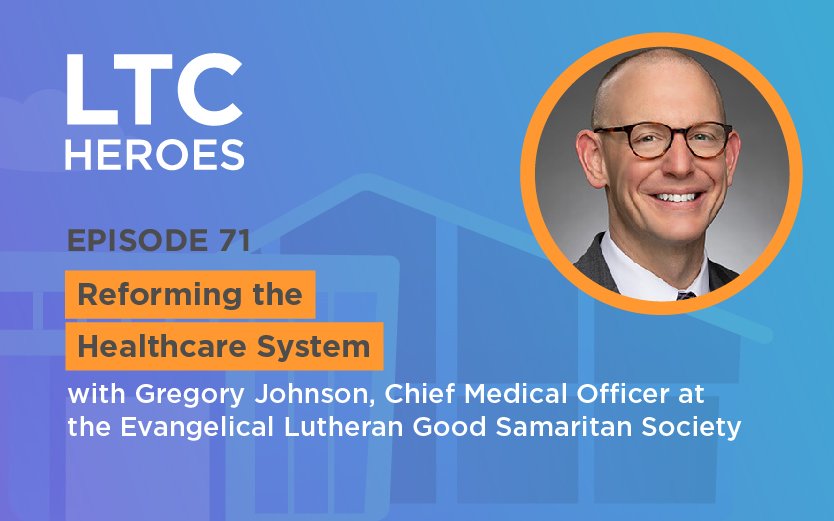On this latest episode, we speak with Dr. Gregory Johnson, Chief Medical Officer at the Evangelical Lutheran Good Samaritan Society, at the 2022 NNFA-NALA Innovation Summit in Lincoln, Nebraska.
The Evangelical Lutheran Good Samaritan Society is the largest not-for-profit provider of senior housing and services in the United States. The company is headquartered in Sioux Falls, South Dakota, and operates centers throughout the United States.
On this episode, we discuss various topics with Gregory, including:
- Accountability in healthcare.
- How he moved into the long-term care industry.
- Key moments when he realized he made a difference in people’s lives.
- His favorite parts of the day, including interactions with others.
- Bad advice shared in the long-term care industry.
- His thoughts on reforming the healthcare system, including how we pay for healthcare.
- What he’s learned about himself in the past three years as a leader, the way he’s handled the pandemic, and the way he’s made decisions.
- … and so much more
Reach out to Gregory and his team by heading to the Evangelical Lutheran Good Samaritan Society website.
Learn about Dr. Gregory Johnson’s experiences and stories in the long-term care industry by tuning into the latest episode of LTC Heroes below.
Rapidfire Q/A
What brought you to the Nebraska Convention?
I am headquartered in Sioux Falls and they asked me to come down and talk about ‘the forbidden conversation’ in healthcare. And I didn’t even know what it was about.
But I said I’d be happy to come. So it’s been great.
When you talk about accountability, what are you thinking of?
So for us today, when we talked about accountability, some of it was defining what it is and what our expectations were, that didn’t get met. But then later on, we discussed digging into all the different ways we can get at the root of how the other party’s actions didn’t fulfill.
How did you get into long-term care?
I was in a family medicine residency and there’s a leader in the field. His name is Dr. David A. Brechtelsbauer. He’s just recently retired.
He’s just kind of an icon among geriatricians. He was in the residency program I went to for family medicine and took me under his wing. So that was a piece of it.
I felt like I needed to focus. But then, once I started walking toward long-term care and returned, it’s such an incredible population of people. And I think at its core, it’s very, very team-oriented.
Are you optimistic about the future of healthcare?
I’m not suggesting that we change our overall government but at least the way it’s set up today.
And so, to get to a space where I could be optimistic, we have to go back to how we pay for health care. Today, we pay for healthcare.
And we’ve been saying this for 10 or 15 years, but we pay for health care transactionally. And we pay for it piecemeal. And as a physician, I was always frustrated that even if I knew it was suitable for the patient, if it wasn’t on the menu, so to speak, I can’t get it for you.
What have you learned about yourself in the last three years?
We have learned that we need to go out and see and understand. We were isolated or separated by distance in our systems in 22 states. And that’s already hard.
Also, people are good. And we need to believe that, and that’s what we need to spread.
We appreciate you listening, and we are motivated by your feedback. Visit LTCHeroes.com to learn more about us and head to LTCHeroes.com/community to join our exclusive Facebook Group for Nurses and our exclusive Linkedin group for Long-Term Care Owners. We look forward to seeing you inside the community.
—
Sponsored by Experience.Care
This episode is brought to you by Experience.Care, the only long-term care EHR backed by guarantees.
Your profitability is our priority and your compliance, our cause. Since 1969.
Get your profitability consultation today at Experience.Care/guarantee. Our website is .Care for a reason. We care about your care. Visit us at Experience.Care.

